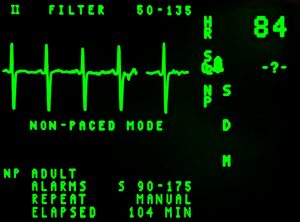
Even though echocardiography and electrocardiograph technician jobs have many things in common and they both involve examining the heart to observe its performance and look for possible cardiac conditions, there are some slight distinctions between them.
Actually, echocardiography techs use ultrasound technology to record images of the heart and its components, while electrocardiograph techs use tools that record the heart’s electrical activity.
What makes them similar is that these two careers require similar education and certification requirements.
Still, echocardiography techs earn more money for their skills.
No matter which career you choose, you will be allowed to work in a variety of medical facilities and laboratories, and you can expect good job prospects.
Page Navigation
Job Description
Echocardiography and electrocardiograph technicians are professionals who are well trained to use diagnostic imaging tools to check the heart’s health and functioning, but the main difference is in the tools and techniques they use.
Echocardiography techs utilize ultrasound machines to make images of the heart that they can view on a monitor.
Electrocardiograph techs instead use electrocardiograph machines with electrodes that are attached to multiple points on the patient’s body and record the heart’s electrical activity in a graph format.
Whichever procedure is done, it requires preparing patients, providing information about tests, setting up and configuring equipment, and sharing findings with physicians.
Both professionals need to possess physical strength, being that they will spend a lot of time standing and helping to position patients for proper testing.
Education Requirements
When it comes to education requirements, these two professions have similarities.
No matter If you choose echocardiogram tech and electrocardiograph tech jobs, they will require a certificate or degree in diagnostic medical sonography, cardiovascular technology, or a similar area.
During these programs, students will be taught medical terminology and diagnostic imaging techniques and include clinical practice at a medical facility.
Employers are those who determine whether you will need certification and specialized certification in sonography or cardiac technology to get the job.
State Cardiovascular Credentialing International’s Certified Cardiographic Technician (CCT) credential is available for electrocardiograph techs, while the American Registry for Diagnostic Medical Sonography offers multiple echocardiography credentials.
Industry
Once you graduate, you should not worry about employment, being that the majority of general and specialty hospitals employ echocardiogram and electrocardiograph technicians, and furthermore, you can look for employment in physicians’ offices, outpatient care centers, and diagnostic laboratories.
Their duty is to work on their own with patients in special imaging rooms, and later on, coordinate with doctors.
They sometimes visit patients’ rooms to do procedures there as well.
These diagnostic imaging professionals may work irregular hours if they find work in hospitals that work 24/7 while those working in doctors’ offices and other facilities with limited operating hours will have more regular schedules.
Years of Experience and Salary
According to the statistics, the annual pay for an echocardiography technician is higher than for an electrocardiograph technician.
You can notice that the salary increases with the years of experience, and echo technician wages see larger increases with experience than electrocardiograph tech wages.
The average salary progression for these careers may look like this:
Echocardiography Tech
- 0 to 5 years: $56,000
- 5 to 10 years: $62,000
- 10 to 20 years: $68,000
- 20 or more years: $74,000
Electrocardiograph Tech
- 0 to 5 years: $28,000
- 5 to 10 years: $33,000
- 10 to 20 years: $36,000
- 20 or more years: $37,000
Job Growth Trend
If you possess the required education, you should not worry about your future as this professional, due to the fact that the U.S. Bureau of Labor Statistics expects fast job growth for both diagnostic imaging jobs.
Generally, echocardiography techs have better prospects overall, as their jobs are expected to grow at a faster rate of 23 percent compared to 10 percent for electrocardiograph technicians.
An increased need for these professionals and imaging services, in general, is due to the rise in heart disease in the older population.








